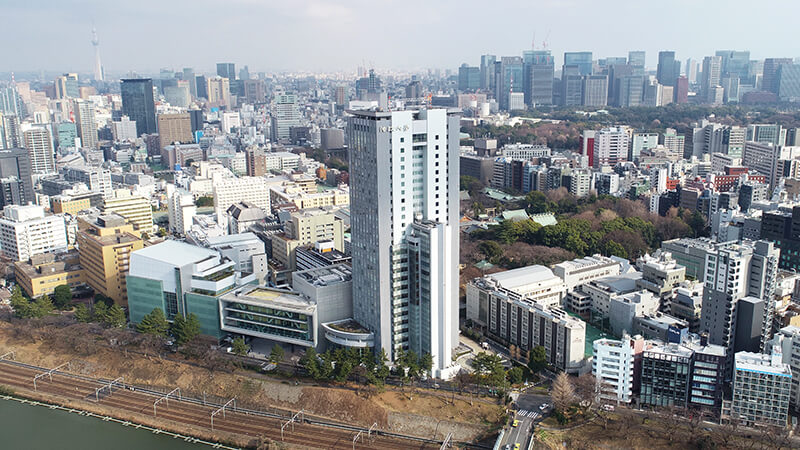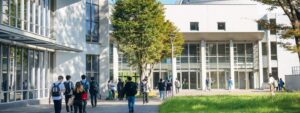言語が人間の現実把握に及ぼす影響 (The Influence of Language on Human Perception of Reality)

法政大学市ヶ谷キャンパスのボアソナード・タワー
2021 年実施の法政大学英語入試問題に、言語が人間の現実理解に影響を与えるという英文が使用されていた。
方向は左右ではなく、東西南北
入試問題の冒頭に、オーストラリアの原住民である ポーンプラーウ (Pormpuraaw) の人々は、「右」と「左」を表現する言葉がなく、すべて東西南北で表すという、衝撃的な事実が述べられる。
しかし世界の言語のおよそ 3 分の 1 は、右と左ではなく、東西南北で表現するという。そのような言語を持つ人びとは、方向感覚に優れているようだ。
About a third of the world’s languages spoken in all kinds of physical environments rely on absolute directions for space. As a result of this constant linguistic training, speakers of such languages are remarkably good at staying oriented and keeping track of where they are even in unfamiliar landscapes.
(訳) あらゆる生活環境で話されている世界の言語の約 3 分の 1 は、空間の絶対的な方向に依存している。この絶え間ない言語訓練の結果、そのような言語を話す人は、なじみの薄い風景の中でも、方向感覚を保ち、自分がどこにいるのかをたどることに非常に優れている。
そこで次のような疑問が起こってくる。
So if Pormpuraawans think differently about space, do they also think differently about other things, like time?
(訳) では、もしポーンプラーウの原住民が空間について異なる考え方をするなら、彼らは時間のような他のものについても異なる考え方をするのであろうか?
言語により時間配列が違う
調査の結果、時間についても異なった考え方を持っていた。
Pormpuraawans, we found, arranged time from east to west. And many other ways to organize time exist in the world’s languages. In Mandarin, the future can be below and the past above. In Aymara, spoken in South America, the future behind and the past in front.
(訳) ポーンプラーウの原住民は、東から西に時間を配列したことがわかった。 そして、世界の言語には、時間を整理する方法が他にもたくさんある。標準的中国語では、未来は下に、過去は上になりうる。南アメリカで話されているアイマラ語では、未来が背後にあり、過去が前にある。(訳注―アイマラ族とは、ボリビアとペルーのチチカカ湖付近に住んでいる部族)
さらに行為の主体者に対する考え方も、言語によって違うことが分かった。
English speakers tend to say things like “John broke the vase” even for accidents. Speakers of Spanish or Japanese would be more likely to say, “the vase broke itself.” Such differences between languages have profound consequences for how their speakers understand event, construct notions of agency, what they remember as eyewitnesses and how much they blame and punish others.
(訳) 英語を話す人は、偶発事故でも「ジョンが花瓶を割った」などと言いがちである。スペイン語や日本語を話す人は、「花瓶が壊れた」と言う可能性が高くなる。このような言語間の違いは、話者が出来事をどのように理解し、行為主体の概念を構築し、目撃者として何を思い出すか、そしてどれだけ他人を非難し、罰するかに深刻な影響を及ぼす。
言語がおよぼす現実把握の影響
このようにして、言語は人の考え方に大きな影響を及ぼすことが明らかになった。
All this shows us that the languages we speak not only reflect or express our thoughts, but also shape the very thoughts we wish to express. The structures that exist in our languages profoundly shape how we construct reality and help make us as smart and sophisticated as we are.
(訳) これらすべては、私たちが話す言語が、私たちの考えを反映したり表現したりするだけでなく、私たちが表現したい考えそのものを形作っていることを示している。 私たちの言語に存在する構造は、現実を構築する方法を完全に形作り、現在の私たちと同じくらい、私たちを賢く如才なくさせることになる。
外国語学習の重要性がここにある。各言語は独自の表現方法を持ち、それが人の現実把握に大きな影響を及ぼす。一生日本語しか理解できない人は、日本語の持つ思考方法に慣れて、現実を多様な視点から眺めることはできない。大学での外国語教育は、もっと重要性が強調されるべきである。


